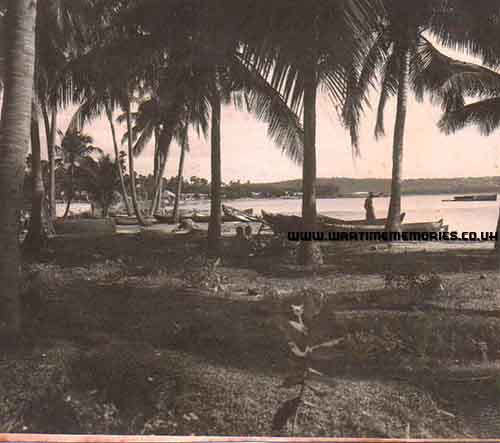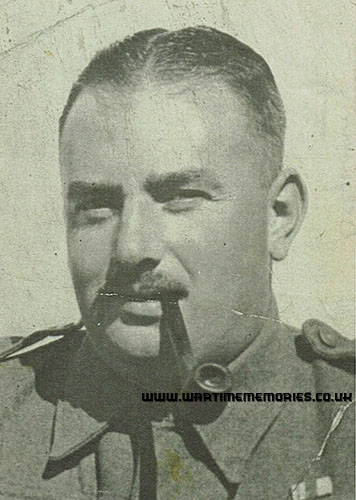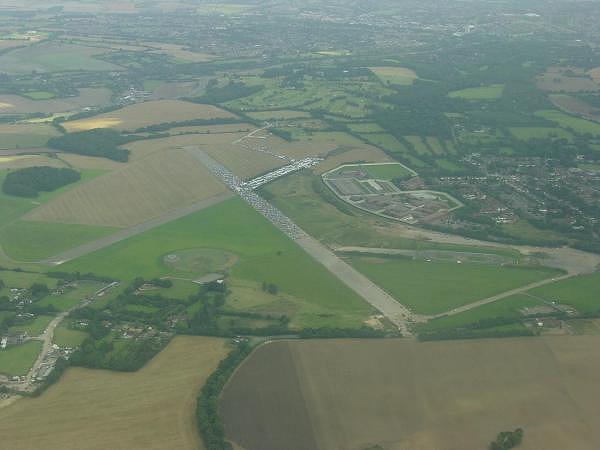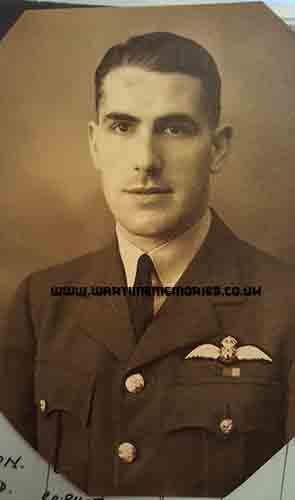Greaser Robert Anderson . Merchant Navy S.S. Pandias (of Greece) (d.2nd July 1941) Greaser Anderson was 45 when he died and is buried in the Boffa Cemetery in New Guinea.
|
AB Robert William Cowling "Bonzo" Anderson . Royal Navy HMS Victory from Aberdeen He deid on 17.12.86
|
Flt.Sgt. Robert "Andy" Anderson BEM.. Royal Air Force My father, Robert Anderson died in 2010, and I have started to look at his old papers and photographs from his time with the RAF Repair and Servicing dept. I have found his RAF Yacht Club membership booklet (his membership number was 523), and photographs of Trincomalee, Koggala, Kandy and others. Sadly, I now wish I had asked him more about his time in the war, but like so many, he was not keen on reliving these times. I will post as many of the photos I have and hope that they will bring back memories for someone else.
|
L/Cpl. Robert Henry Anderson . British Army Royal Artillery from Liverpool My Dad, Robert Henry Anderson served in the second world war in Europe.
On D Day he was in the Brecon Beacons training.
He was deployed to Europe two weeks after D day where he was a wireless operator with the artillery in Belgium & Holland. Whilst there, he suffered a perforated ear as he removed his headphones to make a report just as the gun was being fired next to where he was kneeling.
|
Sgt. Stephen Anderson . British Army 30th Field Regiment Royal Artillery from Consett Co. Durham (d.1st July 1944) Stephen Anderson served with 30th Field Regiment, Royal Artillery.
|
Pte. Stewart Anderson . British Army 4th Battalion Cameron Highlanders from Elgin We think Stewart Anderson was captured at Forges between the 5th and 8th of June 1940.
According to one of his sisters who used to write to him through the Red Cross, she got occasional replies.
We believe he attempted to escape at least twice with fellow POWs. The 2nd time they reached inside Russia and had killed a coo and were ready to feast when caught and warned if they tried to escape they would be shot. We have no idea if that put an end to escapes etc.
Allegedly, his captors weren't as cruel to them, just ordinary working class men, as those who forced march them to eventual freedom. During the Death March to freedom my father was suffering from frost bite and was being carried on a stretcher by fellow POW's and their column was occasionally strafed by aircraft (probably friendly) and he received shrapnel wounds which he still had up until he died in 1958.
He had nightmares on occasion that we all were aware off right up until he died. However, he was a proud and smart soldier and indeed remained a reserve until the end.
|
T Anderson . British Army T Anderson served with the British Army. I have his unissued dogtags, made in preparation for deployment to the Far East and would love to get them home to his family. I am happy to cover all costs. If you are a family member or can put me in touch with them please get in touch. Update: Unfortunately The Wartime Memories Project has lost touch with Dan, his website, facebook page and email have all ceased to function. But if you can add any details about the person listed, please use the add to record link below.
|
TW Anderson . British Army Durham Light Infantry TW Anderson served with the Durham Light Infantry British Army. I have his unissued dogtags, made in preparation for deployment to the Far East and would love to get them home to his family. I am happy to cover all costs. If you are a family member or can put me in touch with them please get in touch. Update: Unfortunately The Wartime Memories Project has lost touch with Dan, his website, facebook page and email have all ceased to function. But if you can add any details about the person listed, please use the add to record link below.
|
Wilbert "Andy" Anderson . Royal Air Force RAF St Eval from New Zealand Does anyone remember my father, Wilbert Anderson (Andy), a young pilot from New Zealand who was stationed at St Eval Airfield in WWII?
|
Pte. William Russell Anderson . British Army 8th Btn. Argyll and Sutherland Highlanders from Baillieston (d.20th Nov 1943) William Anderson was my great grandad's brother. He died in action at the age of 24 whilst stationed in Italy and is buried at Sangro River War Cemetery. His parents were Matilda and Thomas Anderson of Baillieston. He served with the 8th Bn Argyll and Sutherland Highlanders. Unfortunately this is all I know at this time and I have not found any pictures yet.
|
Pvt. William George A. Anderson . Australian Army from Australia POW Camp Fukuoka 17 in Japan
|
F/O. William Boyd Anderson . Royal Canadian Air Force 407th Squadron from Craigmyle, Alberta, Canada (d.20th January 1943)
|
P/O William John Andy Anderson . RCAF 419 (Moose) Squadron (d.24th Mar 1945) P/O William John Andy Anderson J24471 was a pilot based at Middleton St George now Teeside airport and flew Halifax`s from this base for 419 RCAF Moose Squadron. KIA 24th March 1945
|
P/O William John Andy Anderson . Royal Canadian Air Force 419 (Moose) Sqduadron (d.24th Mar 1945) P/O William Anderson was a Pilot based at RCAF Middleton St George.
|
Mne. Gnr. William Earnest Anderson . Royal Navy HMS Mauritius, Royal Marines from Hull
|
Sgt F. Anderson, . RAF 12Sqd. (d.12th Jun 1943)
|
Sgt C. B Anderson. . RAF 12 Sqd. Sgt Anderson was the Mid Upper Gnr. on Lancaster I W4374 PH-D of 12 Sqd.
|
Sgt Frederick Anderson. . RAF 12Sqd. (d.12th Jun 1943) Frederick Andersons was a Mid Upper Gnr. he was killed on the 12th June 1943 in Lancaster W4373 PH-F of 12sqd
|
Sgt J G Anderson. . RAF 12Sqd.
|
S/Sgt. Ralph W. Anderson. . USAAF 327th Bomb Squadron
|
F Anderton . British Army Kings Liverpool Regiment F Anderton served with the Kings Liverpool Regiment British Army. I have his unissued dogtags, made in preparation for deployment to the Far East and would love to get them home to his family. I am happy to cover all costs. If you are a family member or can put me in touch with them please get in touch. Update: Unfortunately The Wartime Memories Project has lost touch with Dan, his website, facebook page and email have all ceased to function. But if you can add any details about the person listed, please use the add to record link below.
|
F/Lt. James "Andy" Anderton AFC.. Royal Air Force 99 Squadron from Bolton, Lancashire My father was James 'Andy' Anderton who completed 30 sorties with RAF 99 Liberator Squadron based in Dhubalia, India, between September 1944 and May 1945. The longest op was 15 hours and his log book entry was 'Day Ops. Marshalling Yards at Jumbhorn Isthmus of Kra. Very good results.' Several other ops were over 10 hours.
His Ball Gunner was Stanley Willis who has already posted on this site.
In his logbook, he lists his crew as follows:
- F/L Anderton, Captain;
- F/L D.Bryant, Co-Pilot No 1;
- F/O G.Holland, Co-Pilot No 2;
- F/O D.Welch, Navigator;
- F/O A.Pearce, Wireless Operator No 1;
- Sgt Fergie, Wireless Operator No 2, (RIP);
- Sgt R.Taylor, Wireless Operator/Beam Gunner;
- F/S N.Sherrard, Flight Engineer/Beam Gunner;
- Sgt L.Saxton, F/Gun;
- Sgt A.Clark, M.U.Gunner;
- Sgt S. Willis, Ball Gunner;
- F/O K.H.Sleeman, Rear Gunner.
I understand Sgt. Fergie flew with another crew and was sadly killed.
|
Cyril Ernest Andre . British Army Royal Corps of Signals My grandfather was at Catterick Camp in August 1940 in Squad 378. He was in the RCS and went to Africa in December 1943.
|
Pvt. Samuel Joseph Andreottola . United States Army K Co. 31st Inf Regt (US) Phil Div. from Massachusetts, USA POW at Camp Fukuoka 17 in Japan
|
Sgt. "Andy" Andrew . Royal Air Force 460 Sqd. Andy Andrews served as a Flight Engineer with 460 Squadron.
|
Lieutenant "Andy" Andrew .
|
Sgt George Simpson Andrew . Army Royal Army Service Corps from Camberslang, Glasgow (d.1st Jun 1945) died in Borneo
captured in Garoet, Java whilst setting up communications for British invasion.
Supposed M.I.A (missing in action) one week before
Regular Soldier for 7 years.
Does anybody have any information on Sgt Geogre Simpson Andrew service number: 193921, RASC, or even know where I can look for a regimental photo. He Joined the Army reserve in 1937, then joined the RASC in 1938. I did hear at one point that there maybe people who were in the same POW camp in Borneo still alive.
Thank you for you time.
|
Medical Orderly George Donaldson Andrew . British Army Royal Army Medical Corps from 40 Dirrans Terrace, Kilwinning, Ayrshire, Scotland My father, George Andrew, was conscripted in 1941 and served in the Medical Corps. After spells in Leeds and Lincolnshire, he was posted to Malta, and after some time there,to Kos. He was captured by the Germans(3/10/43)- although they knew the Germans were coming, escape was impossible.
After capture,he spent 15 days in a train (in a goods wagon) travelling to Stalag 4b (Muhlburg) where he lived out the rest of the war. There was one piece of ground in the camp which the prisoners were not allowed to touch (although I believe they were allowed to grow vegetables elsewhere): the bodies of Russian prisoners who had died from typhus a few years earlier were buried there.
A few weeks after VE Day, with the rumour that the Russians were coming, he managed to get out and reach the U.S.lines with a friend; they had no food but a farmer's wife cooked her "laying hen" for them. The Americans flew them to R.A.F. Northolt (in a DC-3) and father said that seeing the White Cliffs of Dover was a wonderful feeling.
My father died in January 2006, just short of his 90th birthday.
|
Spr. John Andrew . British Army Royal Engineers from John St. Furlong Lane, Burslem, Stoke on Trent My father, John Andrew, joined the Army in October 1939 for the duration of the war with the Royal Engineers as a Sapper, at the Drill Hall, Stoke On Trent. He was 19 years and 11 months old.
He was told to go to Plymouth by the Sergeant, and he went with his friend Albert who was from Fenton Stoke on Trent. They then moved from Plymouth to Dovercourt and on the 1st of December 1939 the company sailed to France and docked at Cherbourg, they stayed there for a short while then went to Boulogne, where they all slept in a fish market. They all moved out of the fish market, just as they had left there the Germans bombed the fish market. They all went into the army trucks and moved to Camiers then to Etaples then back to Boulogne. They were all surrounded by German snipers at the docks in Boulogne and all had to make a run for it to the railway station and they got there The Welsh Guards were already there. The Royal Engineers and The Welsh Guards had run out of ammunition. and were surrounded by the Germans. One of the German soldiers had his finger on the trigger and he was laughing when he said, well lads the war is over for you. They were all now prisoners of war.
They all left Boulogne on the 25th of May 1940 and had to march into Germany, which took three weeks, sleeping in open fields in all sorts of weather. Then they marched into Poland to a big city called Poznan. To an underground fort which had big metal doors. They were at the fort for 11 months. Then they left Poland by rail into railway wagons which had sliding doors, they were pushed like cattle and taken to a prisoner of war camp which was Stalag 344. They worked at a grave stone factory and the other half at a paper mill. Some of the prisoners were moved to Stalag v111B at Lamsdorf. My Dad was one of those people, he worked in the salt mines but he started to cough up blood and was moved to working in the Black Forest sawing down trees.
When Dad was in Stalag V111B he met Commander Douglas Bader, who was known for trying to escape. My Dad was interested in music, so were some other soldiers that dad knew. Dad played the harmonica; one played the banjo, the accordion also the guitar. Dad had been playing the harmonica since the age of three. An English Officer asked my Dad if he would play his harmonica in the concert Dad said that he was nervous in front of a lot of people. The Officer told him to close his eyes so he wouldn’t see anybody. So Dad agreed to play his harmonica in the concert. This was 1944. The Americans and the Russians joined forces with England and the prisoners heard that there was going to be an invasion which did happen in June 1944. The prisoners of war woke up one morning just after Christmas 1945, and found that all the guards had left the camp. The prisoners of war got into the army trucks that had been left and went their separate ways. Dad was helped by some Russian soldiers who gave him some food. Dad then reached the American lines and was deloused and taken by plane with some other prisoners of war and to England. My Dad didn’t go home straight away he was taken to Bournemouth Hospital until he could go home.
|
Pte. John "Jack" Andrew . British Army Royal Engineers from Burslem, Stoke-on-Trent My father, sapper John Andrew of the Royal Engineers, enlisted in October 1939 at the drill hall in Stoke. He was stationed at Raglan Barracks 2 miles outside Plymouth. He then moved to Southampton 1st December 1939 and sailed to France to Cherbourg & then they went to Boulogne.
His company were staying in an old fish market, they were ordered to move out by the Sergeant onto their army trucks because the fish market was under heavy fire. They then moved to Camiers and then to Staples then to Boulogne docks where they were surrounded by German snipers. Some of the soldiers were trying to get back to England across the English Channel.
My dad's friend was named Albert. They then made their way to the railway station and the Welsh Guards were already there. They had to go down steps to an underground air raid shelters and my dad and his comrades had to carry sandbags to the Welsh Guards to make barricades. They ran out of ammunition. The Germans then surrounded them.
My dad and the other soldiers were taken prisoners of war and left Boulogne on the 25th of May 1940 and marched into Germany which took 3 weeks, then marched into Poland to Posnam and marched to an underground fort. They were at the fort 11 months then Stalag 344 then to Stalag v111b. My father used to play an accordion also a mouth organ. In 1945 they woke up one morning and all the Germans had left the camp. My dad and other soldiers left the camp and got to the American lines where they were deloused before getting on a plane to England.
|
|







